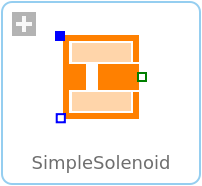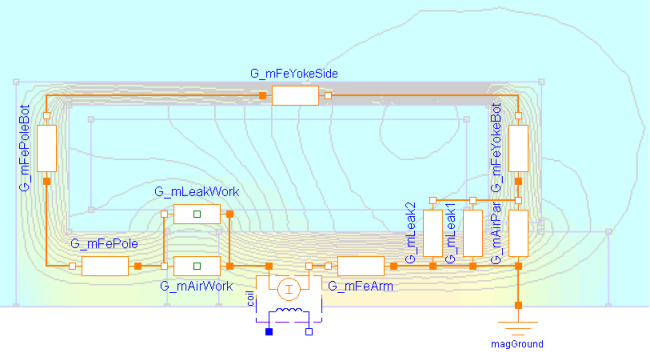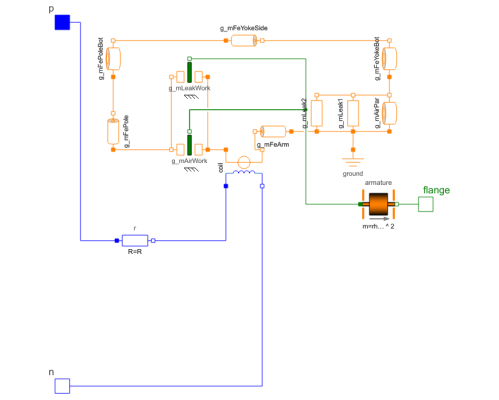WOLFRAM SYSTEM MODELER
SimpleSolenoidSimple network model of a lifting magnet with planar armature end face |
|
Diagram
Wolfram Language

SystemModel["Modelica.Magnetic.FluxTubes.Examples.SolenoidActuator.Components.SimpleSolenoid"]

Information
This information is part of the Modelica Standard Library maintained by the Modelica Association.
Please refer to the Parameters section for a schematic drawing of this axis-symmetric lifting magnet. In the half-section below, the flux tube elements of the actuator's magnetic circuit are superimposed on a field plot obtained with FEA. The magnetomotive force imposed by the coil is modelled as one lumped element. As a result, the radial leakage flux between armature and yoke that occurs especially at large working air gaps can not be considered properly. This leads to a a higher total reluctance and lower inductance respectively compared to FEA for large working air gaps (i.e., armature close to x_max). Please have a look at the comments associated with the individual model components for a short explanation of their purpose in the model.

The coupling coefficient c_coupl in the coil is set to 1 in this example, since leakage flux is accounted for explicitly with the flux tube element G_mLeakWork. Although this leakage model is rather simple, it describes the reluctance force due to the leakage field sufficiently, especially at large air gaps. With decreasing air gap length, the influence of the leakage flux on the actuator's net reluctance force decreases due to the increasing influence of the main working air gap G_mAirWork.
During model-based actuator design, the radii and lengths of the flux tube elements (and hence their cross-sectional areas and flux densities) should be assigned with parametric equations so that common design rules are met (e.g., allowed flux density in ferromagnetic parts, allowed current density and required cross-sectional area of winding). For simplicity, those equations are omitted in the example. Instead, the found values are assigned to the model elements directly.
Parameters (16)
| R |
Value: 10 Type: Resistance (Ω) Description: Armature coil resistance |
|---|---|
| N |
Value: 957 Type: Real Description: Number of turns |
| r_yokeOut |
Value: 15e-3 Type: Radius (m) Description: Outer yoke radius |
| r_yokeIn |
Value: 13.5e-3 Type: Radius (m) Description: Inner yoke radius |
| l_yoke |
Value: 35e-3 Type: Length (m) Description: Axial yoke length |
| t_yokeBot |
Value: 3.5e-3 Type: Length (m) Description: Axial thickness of yoke bottom |
| l_pole |
Value: 6.5e-3 Type: Length (m) Description: Axial length of pole |
| t_poleBot |
Value: 3.5e-3 Type: Length (m) Description: Axial thickness of bottom at pole side |
| t_airPar |
Value: 0.65e-3 Type: Length (m) Description: Radial thickness of parasitic air gap due to slide guiding |
| material |
Value: Material.SoftMagnetic.Steel.Steel_9SMnPb28() Type: BaseData Description: Ferromagnetic material characteristics |
| r_arm |
Value: 5e-3 Type: Radius (m) Description: Armature radius = pole radius |
| l_arm |
Value: 26e-3 Type: Length (m) Description: Armature length |
| c |
Value: 1e11 Type: TranslationalSpringConstant (N/m) Description: Spring stiffness between impact partners |
| d |
Value: 400 Type: TranslationalDampingConstant (N⋅s/m) Description: Damping coefficient between impact partners |
| x_min |
Value: 0.25e-3 Type: Position (m) Description: Stopper at minimum armature position |
| x_max |
Value: 5e-3 Type: Position (m) Description: Stopper at maximum armature position |
Connectors (3)
| p |
Type: PositivePin Description: Electrical connector |
|
|---|---|---|
| n |
Type: NegativePin Description: Electrical connector |
|
| flange |
Type: Flange_b Description: Flange of component |
Components (15)
| material |
Type: BaseData Description: Ferromagnetic material characteristics |
|
|---|---|---|
| ground |
Type: Ground Description: Zero magnetic potential |
|
| coil |
Type: ElectroMagneticConverter Description: Electromagnetic converter |
|
| r |
Type: Resistor Description: Coil resistance |
|
| g_mFeYokeSide |
Type: HollowCylinderAxialFlux Description: Permeance of hollow cylindric section of ferromagnetic yoke |
|
| g_mFeArm |
Type: HollowCylinderAxialFlux Description: Permeance of ferromagnetic armature |
|
| g_mAirWork |
Type: HollowCylinderAxialFlux Description: Permeance of working air gap (between armature and pole end faces) |
|
| g_mFeYokeBot |
Type: HollowCylinderRadialFlux Description: Permeance of bottom side of ferromagnetic yoke |
|
| g_mAirPar |
Type: HollowCylinderRadialFlux Description: Permeance of parasitic radial air gap due to slide guiding |
|
| g_mFePoleBot |
Type: HollowCylinderRadialFlux Description: Permeance of bottom side of pole |
|
| g_mFePole |
Type: HollowCylinderAxialFlux Description: Permeance of ferromagnetic pole |
|
| armature |
Type: TranslatoryArmatureAndStopper Description: Inertia of armature and stoppers at end of stroke range |
|
| g_mLeak1 |
Type: QuarterCylinder Description: Leakage permeance between inner edge of yoke bore and armature side face |
|
| g_mLeak2 |
Type: QuarterHollowCylinder Description: Leakage permeance between inner side of yoke bottom and armature side (r_i = t_airPar) |
|
| g_mLeakWork |
Type: LeakageAroundPoles Description: Permeance of leakage air gap around working air gap (between armature and pole side faces) |
Used in Examples (2)
|
Modelica.Magnetic.FluxTubes.Examples.SolenoidActuator Slow forced armature motion of both solenoid models so that electromagnetic field and current are quasi-static |
|
|
Modelica.Magnetic.FluxTubes.Examples.SolenoidActuator Pull-in stroke of both solenoid models after a voltage step at time t=0 |

